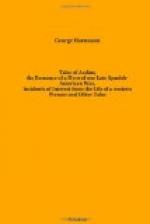This day we descended the mesa and entered the valley of the Verde River, one of Arizona’s permanent water courses. This valley is cultivated for at least forty miles from its source to where it enters precipitous mountains. We forded the crystal waters of the river at Camp Verde, an army post, and crossed another range of mountains and several valleys into a comparatively open country, and on the night of a day late in November we camped on Lynx Creek, and were then within a half day’s travel of our destination.
CHAPTER X. AT THE SHRINE OF A “SPHINX OF AZTLAN”
Not a drop of rain had fallen on us since we left the Rio Grande, the days were as summer in a northern climate, but the nights were quite chill, the effect of an altitude of five thousand feet above sea level. The country had lost its appearance of loneliness, for we passed several parties of miners and heard the heavy booming of giant powder at intervals, and from various directions all through the day.
We were joined by a jolly party of miners who were eager for news and camped with us over night. There were three men in this outfit. Keen-looking, hearty old chaps with ruddy faces and gray beards, they looked like men who are continually prospecting for the “main chance.” I passed a delightful evening in their company. They said they owned rich silver mines farther up on Lynx Creek, and had come out from town to perform the annual assessment work on their claims, as prescribed by the laws of the United States, in order to hold possession and perfect legal title to the ground. As I was not versed in matters pertaining to the mines, I asked why they did not work their mines continually for the silver. They explained that they could not work to good advantage for lack of transportation facilities which made it very difficult and costly to bring in machinery for developing their prospects into mines. Therefore, until the advent of railroads they chose to perform their annual assessment work only.
Two of these gentlemen were substantial business men and the other was their confidential secretary or affidavit man. It was his duty to make an affidavit before a magistrate that his employers had performed the labor required by law, which is not less than one hundred dollars per claim and incidentally he cooked for the outfit and attended to the horses. Of course, they might have hired mine laborers to do this work, but they said they enjoyed the outing and exercise, especially as this was the time of house cleaning and they were glad to get away from home. “Yes,” affirmed the affidavit man, “and so are your wives.”
These gentlemen rode horses and carried a supply of provisions on a pack mule. The most conspicuous object of their pack was a keg labelled “dynamite.” When the clerk placed this dangerous thing near the fire and sat on it, I became fidgety, but was reassured when subsequently I saw him draw the stopper and fill a bottle labelled “Old Crow” from it. They advised me to go prospecting and gave me much valuable information and kindly offered to sell me a prospecting outfit, “for cash,” at their stores.




